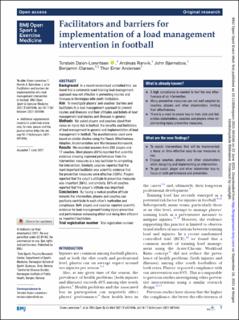Facilitators and barriers for implementation of a load management intervention in football
Dalen-Lorentsen, Torstein; Ranvik, Andreas M.; Bjørneboe, John Andreas; Clarsen, Benjamin Matthew; Andersen, Thor Einar
Peer reviewed, Journal article
Published version
Permanent lenke
https://hdl.handle.net/11250/3009485Utgivelsesdato
2021Metadata
Vis full innførselSamlinger
- Artikler [5068]
- Publikasjoner fra CRIStin FHI [7549]
Sammendrag
Background: In a recent randomised controlled trial, we found that a commonly used training load management approach was not effective in preventing injuries and illnesses in Norwegian elite youth footballers. Aim: To investigate players’ and coaches’ barriers and facilitators to a load management approach to prevent injuries and illnesses and their attitudes and beliefs of load management and injuries and illnesses in general. Methods: We asked players and coaches about their views on injury risk in football, the benefits and limitations of load management in general and implementation of load management in football. The questionnaires used were based on similar studies using the Reach, Effectiveness, Adoption, Implementation and Maintenance framework. Results: We recorded answers from 250 players and 17 coaches. Most players (88%) reported that scientific evidence showing improved performance from the intervention measures is a key facilitator to completing the intervention. Similarly, coaches reported that the most important facilitator was scientific evidence that the preventive measures were effective (100%). Players reported that the coach’s attitude to preventive measures was important (86%), and similarly, 88% of coaches reported that the player’s attitude was important. Conclusions: By having a mutual positive attitude towards the intervention, players and coaches can positively contribute to each other’s motivation and compliance. Both players and coaches reported scientific evidence for load management having injury-preventive and performance-enhancing effect and being time efficient as important facilitators.
